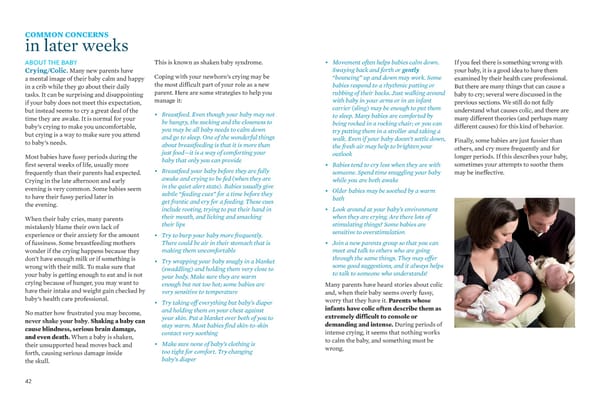COMMON CONCERNS in later weeks ABOUT THE BABY This is known as shaken baby syndrome. • Movement often helps babies calm down. If you feel there is something wrong with Crying/Colic. Many new parents have Swaying back and forth or gently your baby, it is a good idea to have them a mental image of their baby calm and happy Coping with your newborn’s crying may be “bouncing” up and down may work. Some examined by their health care professional. in a crib while they go about their daily the most difficult part of your role as a new babies respond to a rhythmic patting or But there are many things that can cause a tasks. It can be surprising and disappointing parent. Here are some strategies to help you rubbing of their backs. Just walking around baby to cry; several were discussed in the if your baby does not meet this expectation, manage it: with baby in your arms or in an infant previous sections. We still do not fully but instead seems to cry a great deal of the carrier (sling) may be enough to put them understand what causes colic, and there are time they are awake. It is normal for your • Breastfeed. Even though your baby may not to sleep. Many babies are comforted by many different theories (and perhaps many baby’s crying to make you uncomfortable, be hungry, the sucking and the closeness to being rocked in a rocking chair; or you can different causes) for this kind of behavior. but crying is a way to make sure you attend you may be all baby needs to calm down try putting them in a stroller and taking a to baby’s needs. and go to sleep. One of the wonderful things walk. Even if your baby doesn’t settle down, Finally, some babies are just fussier than about breastfeeding is that it is more than the fresh air may help to brighten your others, and cry more frequently and for Most babies have fussy periods during the just food—it is a way of comforting your outlook longer periods. If this describes your baby, first several weeks of life, usually more baby that only you can provide • Babies tend to cry less when they are with sometimes your attempts to soothe them frequently than their parents had expected. • Breastfeed your baby before they are fully someone. Spend time snuggling your baby may be ineffective. Crying in the late afternoon and early awake and crying to be fed (when they are while you are both awake evening is very common. Some babies seem in the quiet alert state). Babies usually give • Older babies may be soothed by a warm to have their fussy period later in subtle “feeding cues” for a time before they bath the evening. get frantic and cry for a feeding. These cues include rooting, trying to put their hand in • Look around at your baby’s environment When their baby cries, many parents their mouth, and licking and smacking when they are crying. Are there lots of mistakenly blame their own lack of their lips stimulating things? Some babies are experience or their anxiety for the amount • Try to burp your baby more frequently. sensitive to overstimulation of fussiness. Some breastfeeding mothers There could be air in their stomach that is • Join a new parents group so that you can wonder if the crying happens because they making them uncomfortable meet and talk to others who are going don’t have enough milk or if something is • Try wrapping your baby snugly in a blanket through the same things. They may offer wrong with their milk. To make sure that (swaddling) and holding them very close to some good suggestions, and it always helps your baby is getting enough to eat and is not your body. Make sure they are warm to talk to someone who understands! crying because of hunger, you may want to enough but not too hot; some babies are Many parents have heard stories about colic have their intake and weight gain checked by very sensitive to temperature and, when their baby seems overly fussy, baby’s health care professional. • Try taking off everything but baby’s diaper worry that they have it. Parents whose No matter how frustrated you may become, and holding them on your chest against infants have colic often describe them as never shake your baby. Shaking a baby can your skin. Put a blanket over both of you to extremely difficult to console or cause blindness, serious brain damage, stay warm. Most babies find skin-to-skin demanding and intense. During periods of and even death. When a baby is shaken, contact very soothing intense crying, it seems that nothing works their unsupported head moves back and • Make sure none of baby’s clothing is to calm the baby, and something must be forth, causing serious damage inside too tight for comfort. Try changing wrong. the skull. baby’s diaper 42
 Breastfeeding Guide Page 21 Page 23
Breastfeeding Guide Page 21 Page 23